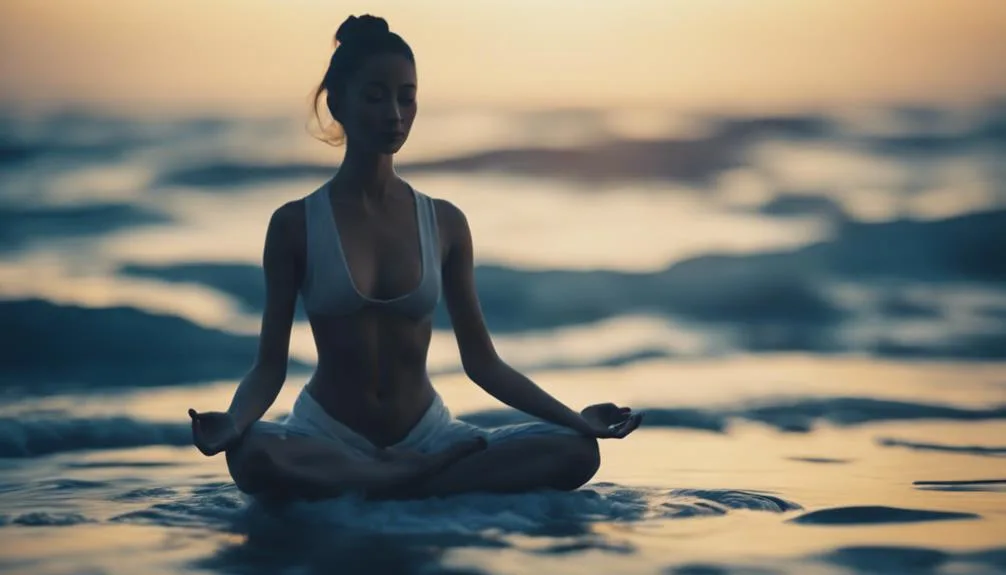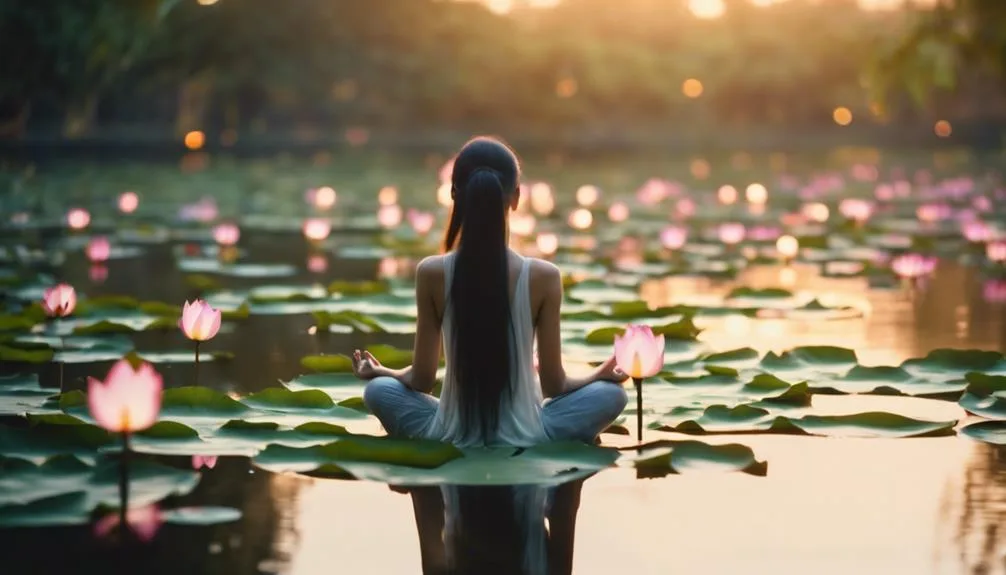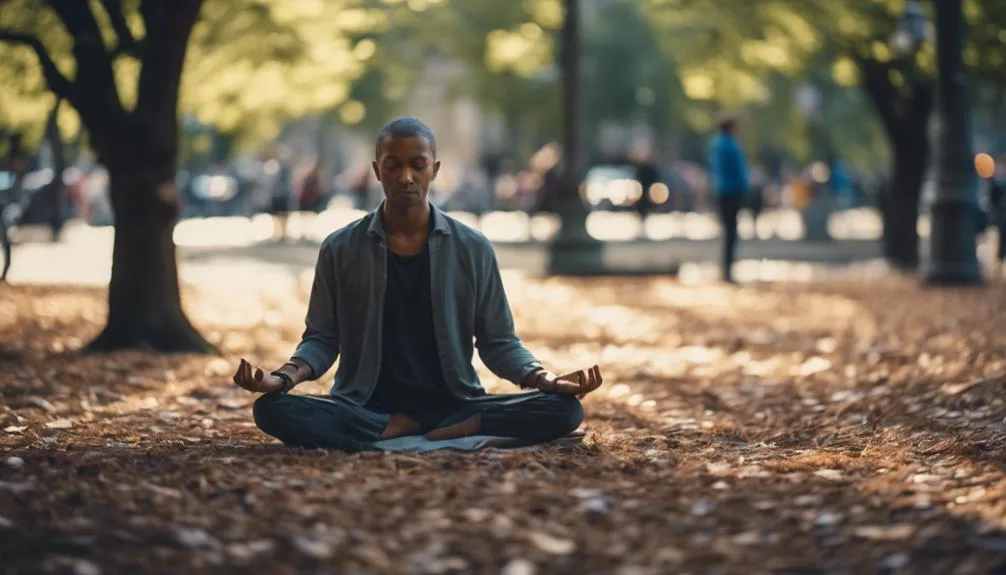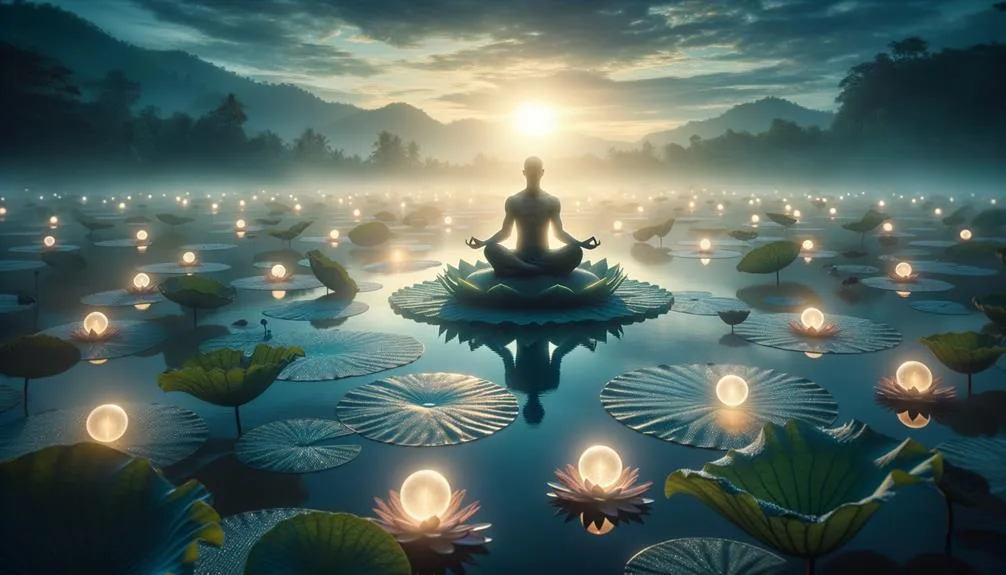In the pursuit of mastering the art of deep meditation, it is paramount to approach the practice with both reverence and systematic dedication.
The initial steps towards this profound journey involve creating a sanctuary of tranquility, where one can retreat from the cacophony of daily life to cultivate an intimate dialogue with the self.
As we explore the various dimensions of preparatory techniques, from calming the mind to adopting postures that enhance focus, we uncover the foundational elements essential for deepening meditation practices.
However, the journey does not end here; the true essence and transformative potential of deep meditation are revealed through consistent practice and exploration of advanced techniques, inviting those intrigued to further investigate the path toward mental clarity and emotional equilibrium.
Key Takeaways
- Creating a tranquil environment is foundational for deep meditation success.
- Mastering deep breathing techniques enhances relaxation and focus during meditation.
- Practicing mindfulness leads to improved mental clarity and emotional balance.
- Regular meditation practice offers long-term benefits including stress reduction and better decision-making.
Preparing Your Space
Creating a serene and clutter-free environment is a fundamental step in preparing for deep meditation, as it facilitates the transition into a state of calmness and focused awareness. Embarking on this journey begins with creating ambiance; a harmonious setting that resonates with one's inner tranquility.
This might involve subtle lighting, perhaps the soft glow of candles, and the inclusion of elements that evoke a sense of peace, such as plants or simple, soothing artwork. Equally important is eliminating distractions. This entails removing any physical clutter that could disrupt the mind's ability to settle. It also involves setting aside electronic devices that could intrude upon the silence, ensuring an unbroken state of mindfulness.
Through these mindful actions, one crafts a sanctuary conducive to profound meditation.
Calming Techniques
To embark on the journey of deep meditation, one must first master the art of calming the body and mind, utilizing techniques that pave the way for profound inner peace.
Relaxation exercises serve as the foundation, gently guiding you into a state of tranquility. Coupled with visualization techniques, they transport you to serene landscapes, fostering a sense of detachment from the day's stresses.
Grounding techniques anchor you in the present moment, creating a sturdy base from which to explore the depths of your consciousness. Meanwhile, body scan meditation offers a systematic approach to relax each part of the body sequentially, ensuring a thorough release of tension.
These practices, when diligently applied, lay the groundwork for a transformative meditation experience, ushering in unparalleled calm and clarity.
Deep Breathing Fundamentals

Delving into the core of deep meditation, mastering the art of deep breathing serves as the foundational skill that not only enhances relaxation but also significantly elevates the meditative experience.
Breath control is essential in this practice, as it allows the practitioner to regulate their nervous system, shifting from a state of alertness to one of calmness and focus. By employing relaxation techniques, such as guided imagery or progressive muscle relaxation in tandem with deep breathing, individuals can achieve a profound sense of tranquility.
This synergy not only soothes the mind but also prepares the body for a deeper meditative state, making the practice more effective and fulfilling. Through these fundamentals, practitioners cultivate a serene mental landscape, paving the way for advanced meditation practices.
Mindful Awareness Methods
Building on the foundation of deep breathing, mindful awareness methods invite a deeper connection with our inner selves by fostering an attentive and open state of mind. Cultivating awareness is more than an exercise; it's a journey towards finding balance in the ebb and flow of life.
Through practices such as mindful observation and non-judgmental acceptance of the present moment, one enhances focus and nurtures inner peace. This intentional shift in awareness allows individuals to engage deeply with their thoughts and emotions, creating a space where tranquility and clarity flourish.
Benefits of Regular Practice

Regular practice of deep meditation cultivates a profound sense of tranquility and mental clarity, enhancing one's overall well-being and resilience in the face of life's challenges. The journey into deep meditation is not just a retreat from the external world but an exploration into the depths of one's inner self, leading to remarkable transformations.
| Benefit | Short-term Impact | Long-term Impact |
|---|---|---|
| Mental Clarity | Enhanced focus | Improved decision-making |
| Emotional Balance | Reduced reactivity | Deeper relationships |
| Stress Reduction | Lowered stress levels | Sustained health benefits |
| Inner Peace | Immediate calm | Lasting serenity |
Embracing these practices regularly opens the door to a life characterized by profound peace and an unwavering sense of purpose.
Sharing the Practice
As we embrace the profound benefits of deep meditation in our personal lives, it becomes a natural progression to share this transformative practice with others, fostering a community of mindfulness and support. The act of sharing not only enriches our personal journey but also strengthens the bonds within our community, creating a supportive environment where individuals can thrive and find solace.
Organizing or participating in meditation retreats offers a unique opportunity to deepen our practice in a serene setting, surrounded by like-minded individuals. Such retreats serve as a sanctuary for personal growth and community support, allowing participants to immerse themselves fully in the experience.
Mindfulness in Daily Life

Integrating mindfulness into daily life transforms ordinary moments into profound experiences of awareness and presence. This practice extends beyond the cushion or meditation mat into every aspect of our lives, offering a pathway to a more connected and conscious way of living.
Mindful eating, for instance, invites us to become fully present with the act of consuming food, appreciating its textures, flavors, and the nourishment it provides, turning a routine activity into a ritual of gratitude and awareness.
Similarly, walking meditation transforms a simple act of moving from one place to another into a deliberate practice of mindfulness. By focusing on the sensation of the ground beneath our feet and the rhythm of our breath, we cultivate a state of moving meditation, connecting deeply with the present moment. These practices enrich our daily life, bringing depth, clarity, and a sense of calm to our everyday experiences.
Popular Meditation Courses
Exploring popular meditation courses offers individuals a structured pathway to deepen their practice and discover inner peace. These courses not only provide essential meditation techniques but also foster community engagement, offering a wealth of mindfulness resources. Below are course recommendations that have been highly valued by practitioners:
| Course Name | Focus Area | Community Aspect |
|---|---|---|
| Mindfulness-Based Stress Reduction (MBSR) | Stress Reduction | Group Discussions |
| The Art of Living | Breathwork & Meditation Techniques | Global Community Events |
| Headspace Subscription | Guided Meditations | App-Based Community Features |
| Insight Timer Courses | Diverse Meditation Practices | User Reviews & Recommendations |
Embracing these courses can significantly enhance one's meditation journey, providing a supportive environment and valuable insights from experienced practitioners.
Frequently Asked Questions
How Can Deep Meditation Impact Our Sleep Patterns, and What Adjustments May Be Necessary to Avoid Any Negative Effects?**
Deep meditation can positively influence sleep patterns by enhancing relaxation and promoting sleep hygiene. However, adjustments like avoiding meditation too close to bedtime may be necessary to prevent disruptions in sleep cycles and dream analysis.
Can Deep Meditation Lead to Significant Changes in Personality Traits, Such as Becoming More Introverted or Extroverted, and How Should One Manage These Changes?**
Deep meditation, akin to navigating the ocean of consciousness, can subtly sculpt personality traits, influencing introversion and extroversion. Managing these changes requires adept personality assessment and change management, fostering a harmonious integration of newfound traits.
What Are the Ethical Considerations in Teaching Deep Meditation, Especially in Ensuring It Is Inclusive and Respects Diverse Cultural Backgrounds?**
Ethical teaching of deep meditation necessitates vigilance against cultural appropriation and actively addressing accessibility challenges to ensure inclusivity and respect for diverse cultural backgrounds. This approach fosters a universally respectful and insightful meditation practice.
How Does Deep Meditation Interact With Technology, Such as Virtual Reality Meditation Apps, and What Are the Pros and Cons of Integrating These Tools Into Practice?**
Deep meditation, when integrated with technology like virtual reality apps, enhances user engagement but also presents health risks. These tools offer immersive experiences, yet require careful consideration to balance benefits and potential negative impacts effectively.
What Are the Potential Environmental Influences on Deep Meditation Effectiveness, Such as Urban Versus Rural Settings, and How Can Practitioners Adapt to These Conditions?**
Environmental factors, notably noise pollution, can impede deep meditation's effectiveness, particularly in urban settings. Practitioners can adapt by incorporating indoor plants to improve air quality and create a serene, natural atmosphere conducive to meditation.
Conclusion
In conclusion, embarking on the majestic journey of deep meditation is akin to unlocking the universe's most guarded secrets, where every breath holds the power to transform chaos into tranquility.
Through meticulous preparation, mastery of breathing, and the cultivation of mindfulness, individuals can ascend to unparalleled heights of well-being. The regular practice of these sacred techniques not only bestows serenity upon the practitioner but also radiates peace throughout communities, making the world a sanctuary of calm.
Engaging in revered meditation courses further amplifies this enlightening experience, guiding souls towards the ultimate liberation.

